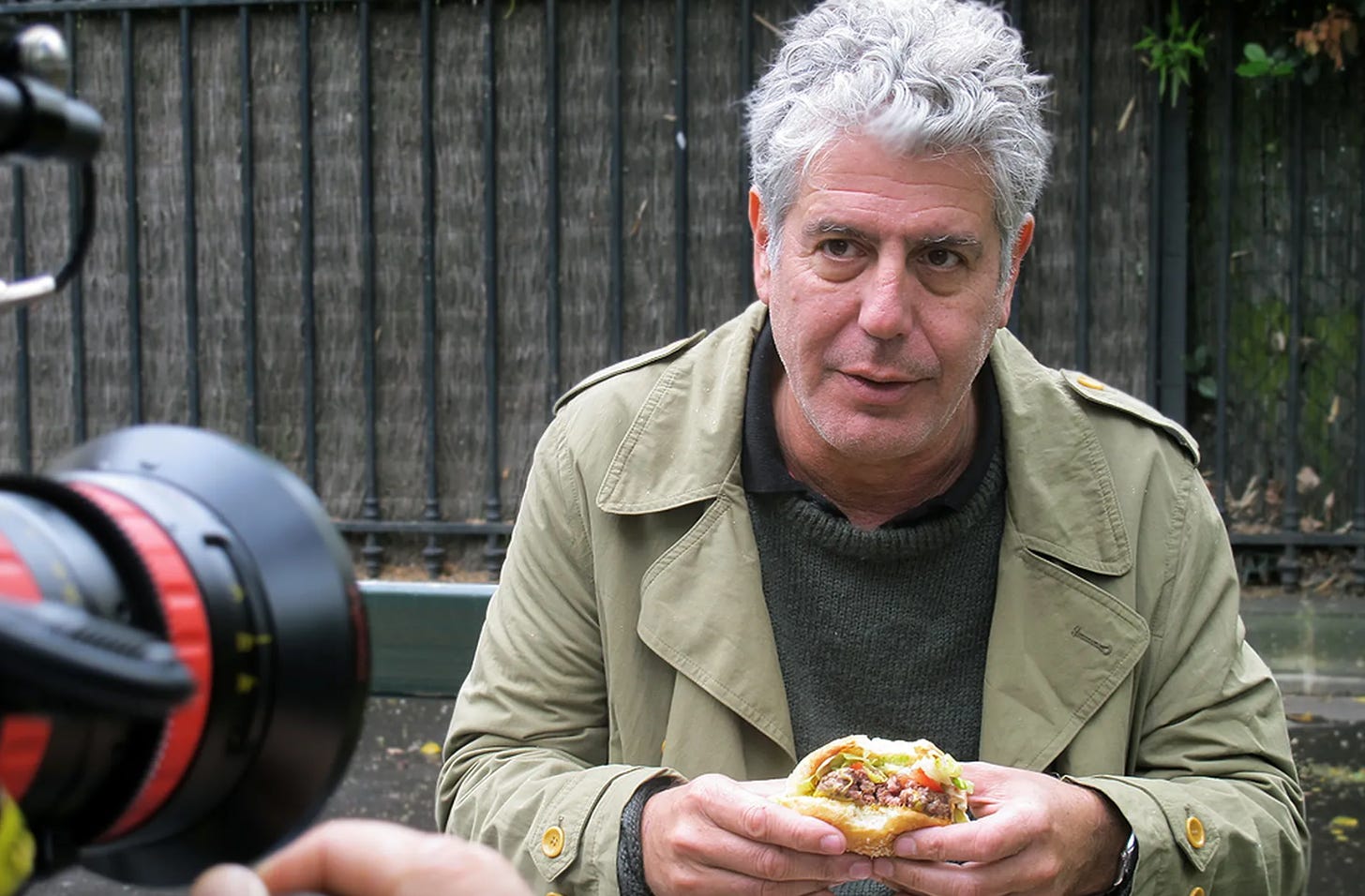What Artists Can Learn From Anthony Bourdain's Three Tips to a Perfect Burger
His burger philosophy could change how you look at your works in progress
It’s been just over six years since chef, travel documentarian, and author Anthony Bourdain died. While he initially became famous for his culinary skills and opinions, I was drawn to him much more for his passion for the broader human experience that he explored through his on-screen travels. His thoughts on any number of subjects always struck me as a kind of street existentialism. He had a philosopher’s heart, you might say, and his theories about food and travel could often be applied to any number of endeavors – including the arts. Today, I want to share with you his three tips for the perfect burger. Yes, burger tips. Trust me me here.
Bourdain quite eloquently lays out these tips in the short video below, which I assure you is worth your time if you’re an artist or just a fan of the hamburger. I prefer his voice on the matter, which comes with subtitles if you require/prefer them, but I’ve had his thoughts transcribed for you, too. Here they are:
With a burger, as with all things that you cook, you have to ask yourself: is this thing I'm doing to this perfectly good classic dish, is it making it better?
It might make it more entertaining. It might dazzle people and say, “Oh, look how clever he is.” It might deconstruct it in a way that impresses people or delights them or astounds them, but does it make it better?
The perfect burger is the classic soft, squishy potato bun, a hunk of well ground, good quality beef, and more often than not processed meltable cheese. Or if you like this kind, these sort of squashed flat, perfectly acceptable twin gray patty — the In-N-Out burger model or Shake Shack model — with some cheese, also perfect.
Now, look, I like a blue cheese burger, but as with all things you cook, there are trade-offs. I like lettuce on a burger. Maybe even a tomato is nice, but it makes it structurally more difficult to eat.
In a perfect world, you should be able to eat a hamburger with one hand and get a representative chunk of all of the elements.
There's a tectonic slide that occurs when you start to overcomplicate and add other products. A burger's a beautiful thing. It's not beautiful when you're wearing half of it, or you're left with two bites of just meat or just bun.
Personally, I approve of ketchup on a burger, mayonnaise if you insist. But beyond that, you have to ask again: am I making it better? Am I making this more enjoyable by adding bacon? Maybe. How should that bacon be introduced into the question? It is an engineering and structural problem as much as it is a flavor experience. You really have to consider all of those things. One of the greatest sins in Burgerdom, I think, is making a burger that's just difficult to eat, where the bread-to-meat ratio is out of whack, where it's either too greasy or not greasy enough, or the damn thing just doesn't hold together the way God intended burgers to hold together.
Let’s make something clear before I continue: I don’t think there’s some artist’s universal truth – some kind of governing creative philosophy about storytelling – hiding inside Bourdain’s hamburger tips.
But also: maybe there is?
One of the early challenges facing an artist is, I believe, recognizing their work in progress’s truest, most appropriate form. This is the engineering/structural problem, Bourdain described in a sense. Being clever is great, but it can also be a handicap. Because a razzle-dazzle “look at me!” form can get in the way of the intent and interrupt the viewer’s ability to emotionally connect with a piece and, before you realize it, your novel, your film, your whatever falls apart like an overstuffed burger.
A great example of what I’m talking about is an unnecessarily complicated structure in a narrative such as cinema or fiction. Rather than point fingers at other people’s art here, I’ll instead use my debut novel, Psalms for the End of the World, to make my point. It was certainly accused of this by some readers who found the mosaic book challenging given how sprawling and diverse its narrative is (I’m grateful critics seemed to appreciate this quality, for whatever that’s worth). What I’ll say to this complaint is I did not set out to write an easy book, nor did I set out to write one that was for everyone. In most instances, even the complaints can describe the emotional experience I hoped readers would have. But I also have to accept that art is subjective and maybe I made it too hard on some readers. Only time will tell if Bourdain’s argument here – that being clever can sometimes ruin a perfect (or just potentially good) thing – will prove true.
Every decision we make as storytellers should, for my money, service the emotional experience we want viewers to have. It’s fine to say we’re only writing for ourselves, sure. But we’re also writing to help others connect with us in some way, aren’t we? We’re holding our hands out to them, asking them to go on this journey with us, and if that journey features a whole lot of unnecessary accoutrements – say, the literary or cinematic equivalents of candied bacon, pickled jalapeños, garlic mayo, you get the picture (while I’m getting hungry) – then we should at least accept that those toppings, as cool as they are, as delicious and fun and interesting as they might be, might also end up all that people remember if we let them, rather than our story, become the point.
My advice to you, whether you take it or not, is to always remember Bourdain’s challenge as you try to identify your story’s truest form. Ask yourself:
Am I making it better?
Okay, all this food talk has left me good and hungry. I think I’m going to go make a burger of my own…
If this article added anything to your life but you’re not up for a paid subscription, consider buying me a “coffee” so I can keep as much of this newsletter free as possible for the dreamers who couldn’t afford it otherwise.
If you enjoyed this particular article, these other three might also prove of interest to you:








There's a common pattern in pop music where a band or songwriter will have an early hit with a song that does exactly what it needs to do. Then, as they get more experienced, the kind of music which is interesting to _them_ changes. They start to pay attention to different elements and they lose some of the initial directness which was so appealing.
Fans may appreciate that they are trying new things, but there's also a sense that they never again do anything as perfect as their first or second album.
It's an easy pattern to see, but I'm not sure there's much that could or should be done about it -- art is partially for the audience, but also reflects a relationship between the artist and their own interests, and that will shift over time.
I have less sense of how writers feel about that dynamic.
He just says everything I would say, so I can't add anything. No notes. Nothing. More bad burgers have pissed me off than made me happy. Ratio: 8 bad to 2 good. Yup, sad but true.
Regarding storytelling and films: too much is too much... does it hold in your mind like a good burger holds in your hand? Do all the flavors meld into an experience where you think: "I love this. I would do this again." THAT'S the story you want to tell. That's what you want an audience to enjoy and tell others about. THAT is what makes your career.
Damn I miss Bourdain. He was a philosopher and straight shooting son of a bitch. LOVE that.
Brilliant, Cole, thanks.